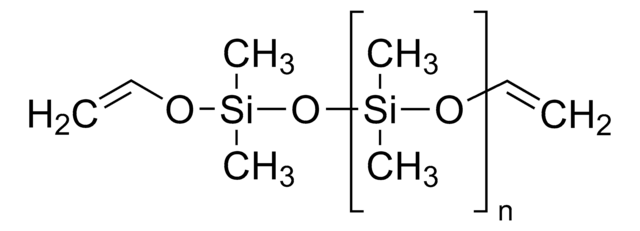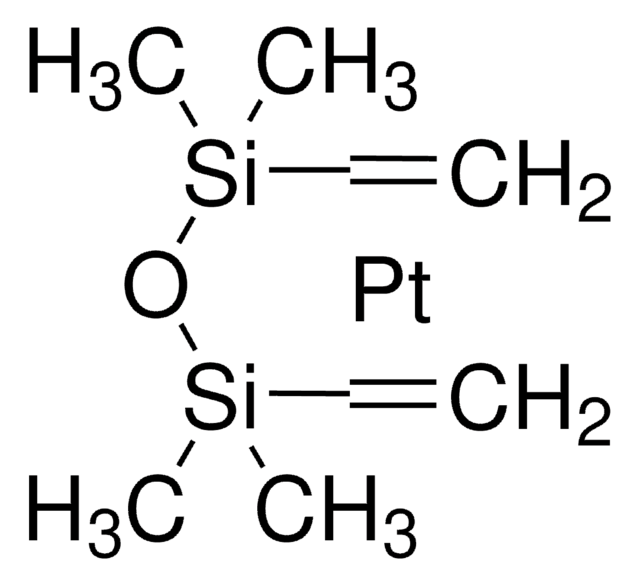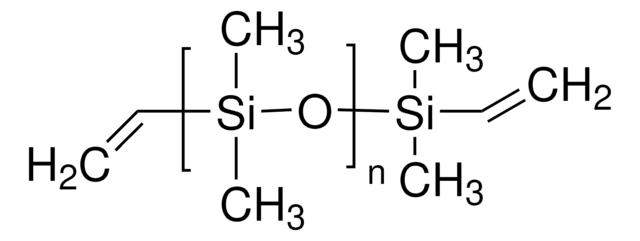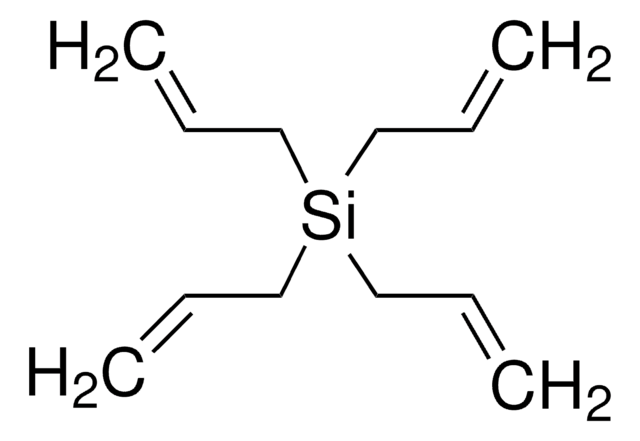396281
2,4,6,8-Tetramethyl-2,4,6,8-tetravinylcyclotetrasiloxane
Synonyme(s) :
2,4,6,8-Tetraethenyl-2,4,6,8-tetramethylcyclotetrasiloxane
About This Item
Produits recommandés
Forme
liquid
Niveau de qualité
Indice de réfraction
n20/D 1.434 (lit.)
Point d'ébullition
111-112 °C/10 mmHg (lit.)
Pf
−44 °C (dec.) (lit.)
Densité
0.997 g/mL at 25 °C (lit.)
Chaîne SMILES
C[Si]1(O[Si](C)(O[Si](C)(O[Si](C)(O1)C=C)C=C)C=C)C=C
InChI
1S/C12H24O4Si4/c1-9-17(5)13-18(6,10-2)15-20(8,12-4)16-19(7,11-3)14-17/h9-12H,1-4H2,5-8H3
Clé InChI
VMAWODUEPLAHOE-UHFFFAOYSA-N
Catégories apparentées
Description générale
Application
- Cyclic siloxanes conjugated with fluorescent aromatic compounds as fluoride sensors: This study explores the use of cyclic siloxanes conjugated with aromatic compounds for sensing applications, offering a pathway for academic chemists interested in sensor technology and fluorescence studies (N Prigyai et al., 2020).
- Synthesis, film morphology and performance of novel crosslinked polysiloxane with end-capped epoxy groups on cotton substrates: This article examines the chemical modification of cotton substrates using polysiloxane derivatives, which can be crucial for developing advanced textile coatings (L Hao et al., 2014).
- Stabilizing Li-rich layered oxide cathode interface by using silicon-based electrolyte additive: This research investigates the use of a silicon-based additive derived from 2,4,6,8-tetramethyl-2,4,6,8-tetravinylcyclotetrasiloxane to enhance the stability of lithium-rich cathodes, important for chemists working with energy storage technologies (T Huang et al., 2024).
Mention d'avertissement
Danger
Mentions de danger
Conseils de prudence
Classification des risques
Repr. 1B
Code de la classe de stockage
6.1C - Combustible acute toxic Cat.3 / toxic compounds or compounds which causing chronic effects
Classe de danger pour l'eau (WGK)
WGK 1
Point d'éclair (°F)
190.4 °F - closed cup
Point d'éclair (°C)
88 °C - closed cup
Équipement de protection individuelle
Eyeshields, Gloves, type ABEK (EN14387) respirator filter
Faites votre choix parmi les versions les plus récentes :
Déjà en possession de ce produit ?
Retrouvez la documentation relative aux produits que vous avez récemment achetés dans la Bibliothèque de documents.
Les clients ont également consulté
Notre équipe de scientifiques dispose d'une expérience dans tous les secteurs de la recherche, notamment en sciences de la vie, science des matériaux, synthèse chimique, chromatographie, analyse et dans de nombreux autres domaines..
Contacter notre Service technique










